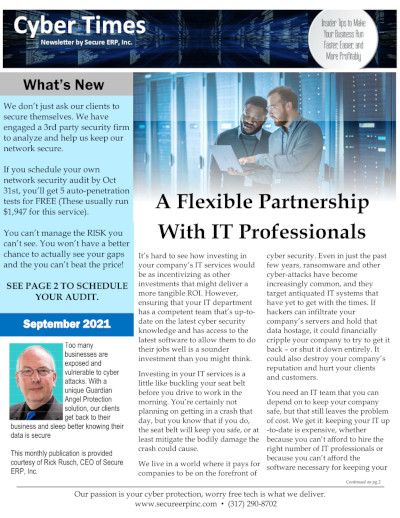
What’s New
We don’t just ask our clients to secure themselves. We have engaged a 3rd party security firm to analyze and help us keep our network secure.
If you schedule your own network security audit by Oct 31st, you’ll get 5 auto-penetration tests for FREE (These usually run $1,947 for this service).
You can’t manage the RISK you can’t see. You won’t have a better chance to actually see your gaps and the you can’t beat the price!
SEE PAGE 2 TO SCHEDULE YOUR AUDIT.
A Flexible Partnership With IT Professionals
 It’s hard to see how investing in your company’s IT services would be as incentivizing as other investments that might deliver a more tangible ROI. However, ensuring that your IT department has a competent team that’s up-to-date on the latest cyber security knowledge and has access to the latest software to allow them to do their jobs well is a sounder investment than you might think.
It’s hard to see how investing in your company’s IT services would be as incentivizing as other investments that might deliver a more tangible ROI. However, ensuring that your IT department has a competent team that’s up-to-date on the latest cyber security knowledge and has access to the latest software to allow them to do their jobs well is a sounder investment than you might think.
Investing in your IT services is a little like buckling your seat belt before you drive to work in the morning. You’re certainly not planning on getting in a crash that day, but you know that if you do, the seat belt will keep you safe, or at least mitigate the bodily damage the crash could cause.
We live in a world where it pays for companies to be on the forefront of cyber security. Even in just the past few years, ransomware and other cyber-attacks have become increasingly common, and they target antiquated IT systems that have yet to get with the times. If hackers can infiltrate your company’s servers and hold that data hostage, it could financially cripple your company to try to get it back – or shut it down entirely. It could also destroy your company’s reputation and hurt your clients and customers.
You need an IT team that you can depend on to keep your company safe, but that still leaves the problem of cost. We get it: keeping your IT up-to-date is expensive, whether because you can’t afford to hire the right number of IT professionals or because you can’t afford the software necessary for keeping your company from getting hacked. That’s why we believe co-managed IT is the best option for companies looking to protect their employees and their customers’ sensitive data.
Co-managed IT is a means by which growing companies can have access to all the tools and knowledge necessary to protect their data without paying the full cost. It won’t replace your current IT team, and it’s more than just a one-off project-based relationship with an outside IT service – it’s a flexible partnership between your business and IT services that you can trust.
Say your existing IT team does a stellar job of putting out the little fires that inevitably happen throughout the workday, but they struggle to find time for building and updating company security systems and protocols that will keep your data safe in the event of a cyber-attack. Or your company is going through a period of rapid expansion, and you can’t hire enough people for your IT department quickly enough to secure your ever-growing databases. Or perhaps your IT team does a stellar job of finding balance between the daily tasks and preventive maintenance, but they lack the software tools to do so efficiently. In all these scenarios, co-managed IT can ensure that those gaps your IT team just can’t fill on their own get filled through a collaborative effort.
Co-managed IT can be a great solution for a burnt-out, potentially disgruntled IT team. If you don’t know whether your IT team is getting burnt out or not, you can look for a few different signs. If they’re constantly working late or on weekends, they’re not getting projects done on time or correctly, they aren’t creating any new security measures or they’re showing signs of aggression or frustration at their job, you might be burdened with a burnt-out IT team.
Ideally, a burnt-out IT team would welcome help with their responsibilities and see the benefits of the collaborative effort between them and another group of experienced IT professionals. Together, we can protect your company from hackers, if you’re willing to invest in your IT infrastructure. Even though you might think that keeping things the way they are won’t cost you a dime, with how common cyber-attacks are becoming, it could only be a matter of time before hackers hold your data for ransom and cost you everything.
With all this in mind, we strongly encourage you and your IT lead to come to a diagnostic consultation with us. We’ll help you understand how, moving forward, co-managed IT can save your company a boatload of money and trouble.
Cyber Security TIPs
If you process or store credit cards in any manner, you are required to comply with PCI DSS, or Payment Card Industry Data Security Standards. This is a set of LEGAL requirements you must abide. All it takes is an employee writing down a credit card number in an e-mail or on a piece of paper to violate a law; and then you’ll be left with legal fees, fines and the reputational damage incurred when you have to contact your clients to let them know you weren’t properly handling their credit cards.
Getting compliant – or finding out if you ARE compliant – isn’t a simple matter I can outline in a 1-2-3-step checklist. It requires an assessment of your specific environment and how you handle credit card information. Here's a blog I wrote that may be helpful, "5 Simple Tips to Protect Sensitive Data."
HIPAA Compliance is more affordable and easier than you think. Review our HIPAA Compliance Service Page: www.secureerpinc.com/hipaa-security-compliance-services/
A great resource is the PCI Security Standards Council, or www.pcisecuritystandards.org. If you want assistance call us for a free consultation. - R2
What Is The #1 Key To Success?
 Dr. Geoff Smart: The Key To Success Is Building A Talented Team
Dr. Geoff Smart: The Key To Success Is Building A Talented Team
To start off, I’ll tell you what the key to lasting success isn’t. It isn’t financially savvy, competitiveness, humility or even hard work. Lots of people embody those traits, so they won’t cause you to stand out from the crowd. No, what it really takes to be successful is hiring a talented team.
Successful leaders aren’t successful just because of the things that they do on their own. They find success in hiring the right people for the right jobs. That’s ultimately what leaders do: they assemble talent and allocate it toward a worthy goal. They have to understand a person’s strengths and weaknesses and perceive if and how that person will further the mission of the team, whatever that may be. With a stellar team in place, the decisions of one person become less and less important.
If you don’t think that hiring a talented team is the ultimate sign of your success as a business leader, then maybe I can convince you if I approach my point from a different angle. In my book Who, which I wrote with Randy Street, one of the first things we established was that one of the biggest problems facing companies today is unsuccessful hiring. At the time, it cost companies $1.5 million per year, and the average company had a success rate of just 50%. Wouldn’t it make sense that solving this problem, which is arguably the most important problem many companies face, would be the key to lasting success?
Marshall Goldsmith: The Key To Success Is Creating Lasting Positive Change In Yourself And Others
I would agree with Geoff that success isn’t dependent on any of the common, pithy traits like trust, passion, honesty or engagement, but I don’t think it necessarily has to do so much with a leader’s team. I think that lasting success still starts when one person commits to make the most useful change that will bring about the most good for their business.
So, while having a talented team is important, at the end of the day, if you’re not committed to changing yourself, then you won’t be able to enact positive change in others when needed either. Your lasting success can only start with you, no matter how much talent you surround yourself with.
That’s why in my book, What Got You Here Won’t Get You There, I emphasize so many different “behavior derailers,” like passing judgment, making destructive comments, telling the world how smart you are, etc. Changing these things within yourself where lasting success begins.
 Dr. Geoff Smart is the chairman and founder of ghSMART, which serves Fortune 500 companies and helps their CEOs make impactful, successful decisions. He is also the author of the New York Times best-selling book, Who, and many others.
Dr. Geoff Smart is the chairman and founder of ghSMART, which serves Fortune 500 companies and helps their CEOs make impactful, successful decisions. He is also the author of the New York Times best-selling book, Who, and many others.
Marshall Goldsmith is one of the most successful leadership coaches currently working. He is the only two-time #1 Leadership Thinker in the world, as ranked by Thinkers 50. He has written 42 books, many of which are-sellers.
Why Cyber-Attacks Are Getting So Dangerous
Cyber-attacks on companies are becoming increasingly common. As many companies adapted to the work-from-home culture that came about during the pandemic, they left their systems vulnerable to hackers who could steal their valuable data or hold it for ransom.
Some companies have been able to recover most of their data through the use of backup copies, but all too often, companies see massive interruptions to their operations and make enormous ransom payments. In fact, in the first quarter of 2021, 41% of insurance claims in Europe were related to ransomware.
If it happened to them, it can happen to your organization too. Create a security-conscious work culture, create backups for your data, keep your systems up-to-date and hire security consultants to help you patch up any holes. Cyber-attacks can happen to you, but they don’t have to.
How Do You Build Client Trust?
Building trust between yourself and your clients or customers is critical for making sales. If you have a client’s trust, they’ll work with you regardless of any other hurdles they have to clear to maintain their relationship with you. If you get the impression that potential clients and customers don’t trust you, try these two methods for gaining their trust.
Share Client Case Studies With Them. If you can show customers how you benefited someone else’s life with your business, they might be more inclined to see you as someone who can help them as well. Find a customer who you’ve successfully helped in the past. Then, with their permission, map out their struggles and how your services helped them overcome those struggles.
New customers will see themselves reflected in those case studies and be more willing to trust you.
Share Video Testimonials With Them. While serving the same basic function as a case study, videos of client success stories help new clients “see it to believe it.” These can capture tone and emotion like written words cannot, thus making them a potentially more effective tool for establishing trust in your business.
Building A Virtual Team That Spans The Country
As many businesses found out this past year and a half, miscommunications happen all the time when any team is working virtually. Most of how we communicate with one another is nonverbal, so it would make sense that things would get lost in translation when just chatting through Slack. Nevertheless, there are a few key ways that businesses can learn to communicate well and build a great virtual team.
Create Spaces For Personal Stories. Whether this looks like a group call where the team talks about non-work-related things or you have a virtual “coffee break” every morning, talking about your personal life will help you build trust with your fellow team members.
Make Communication Simple. Make sure the communication channels are clear, then use them correctly. If everyone knows where to find instructions for their workload, then miscommunications will be kept to a minimum.
Set Clear, Attainable Goals. When something needs to get done, don’t make general statements about how you’ll get there. When you communicate the task to others, mention dates, times and specific steps for getting the task done.


 Contact Us At
Contact Us At



